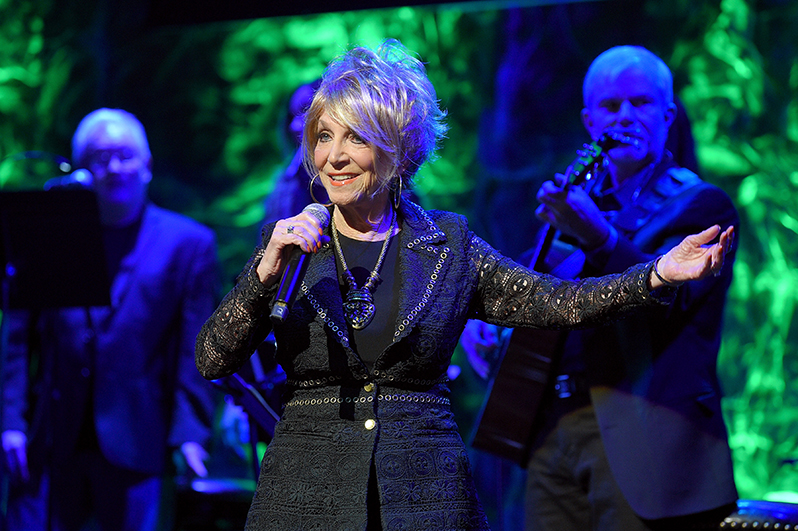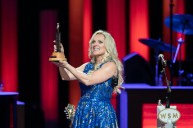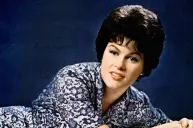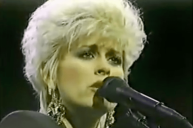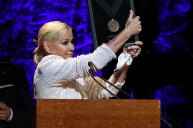Jeannie Seely has always been determined to do things her own way. And she has. Whether it's becoming the first woman to host the Grand Ole Opry, addressing new subjects in country music with her song "Don't Touch Me" or (unintentionally) becoming the first artist to wear a miniskirt on the Opry stage, the 53-year veteran of the historic country music program has managed her career on her own terms.
Videos by Wide Open Country
The 80-year-old country music icon known as "Miss Country Soul" is continuing to blaze her own trail with her new album An American Classic. The 13-track album features collaborations with Vince Gill, Lorrie Morgan, Steve Wariner, Waylon Payne and Willie Nelson.
Below, read Wide Open Country's chat with Jeannie Seely, in which she reflects on helping to kick down doors for fellow female artists, her friendship with Dottie West, 50-plus years of the Grand Ole Opry and more.
Wide Open Country: What do you remember about your first appearance on the Grand Ole Opry?
Jeannie Seely: "It was pretty scary. I stood there, I remember thinking during my first guest appearance every emotion you can think of, from sheer error to sheer thrill, excitement -- everything was going through my mind. It was a wonderful experience. Everybody treated me so great. And that's what set the tone for me to know how to treat the people coming in. My mind goes back to how friendly everybody was. When we have somebody new coming in for their debut, if possible, I always like to go find them and talk to them a little bit, especially if I'm the one who's introducing them."
Was there anyone who was a mentor to you during your early years on the show?
"Well, we didn't have a lot of female mentors. I had my peers, but Ernest Tubb, of course, was one of the main ones that helped me a lot when I first went to the Opry. I remember he told me 'You're going to do really well here. They're going to love you.' But he said, 'I want you to remember something: When you're out there on the road, that's your show. But when you come in to the Opry, you're a part of this one.' There's been some artists that have come in [to the Opry] and somebody needed to tell them that. [Laughs] But unless somebody tells you, you don't know how it works. The Opry is so unique. It's not just another concert venue -- it's something on its own."
You were also a trailblazer when it came to pushing for women to host the Opry.
"That was a door I kicked on constantly because I just thought that it was -- First of all, it, what mattered is it just wasn't right that because your're a female you're not allowed to do something. And also I felt like the women would care more. They would do their homework more... The guys didn't seem to pay any attention. It felt like they pretty much slept it off. Maybe not intentionally, but they did. And so I just thought it was important to be treated equally, you know?
It was such a sense of pride for me once I was able to [host]. Bob Whittaker is the manager we can thank for that. He said, 'I'm going to run you out there, Seely. But you better be able to handle it or we'll both be in trouble.' And I knew if I didn't, the door would be closed -- not only on me, but on all the other women coming up. I thought, 'This is an opportunity and you've got to make the best of it.' And I have to tell you, it was such a sense of satisfaction and pride when I was able to stand back and see Lorrie Morgan and Pam Tillis. They were the first two that I remember to come in and be able to walk out there with no reservations, get the microphone, take over the show and control that huge, wonderful ship that's going out all over the world."
Have other women who perform at the Opry talked to you about it?
"Lorrie and Pam both know and appreciate it. And a lot of the younger ones coming through. Maggie Rose just complimented me the other night when she was there. I adore her. I'm just very impressed with the new women coming up. I'd like to mention Kalie Shorr. I think she has stepped out and pulled this sisterhood together so well. Truly, all of us, as female artists, we are all in competition. We've always been. But we will never have stronger support than each other. When you get right down to it, we were our only support for each other. I love seeing that continue and even get stronger. And the songs that are being written -- I always like to mention Tenille Townes' song "Somebody's Daughter." That one has nothing to do with the business. It was just compassion for another woman and it's so strong."
Did you have a bond with the other female artists when you started on the Opry?
"There was a strong bond there. Of course, we were all thrown together at the Ryman. We didn't even have a dressing room. We were all in the ladies restroom and crammed in together. And one of the first ones was Jean Shepard, who was one of my heroes. I was so new and I was afraid I was in the way. I was standing there and Jean Shepard handed me her hairbrush. She said, 'Here Seely, you ain't doing nothing. Fix the back of my hair.' And I'm like, 'I don't know anything about doing hair and this is Jean Shepard! What if I don't do it right?' [Laughs] And she just chuckled and said thank you. Later, I realized she didn't need me to fix the back of her hair. That was her way of making me feel welcome and making me feel like one of them. And I've always appreciated that."
How did you manage to stay true to your own path and your own vision?
"Well, I was very fortunate. When I left home -- I grew up in Pennsylvania -- I went to Southern California. [It was] not to get into the entertainment business, although I'd been doing radio since I was 11. But I left to get out of the Northeast winters. [Laughs] But once I got out there, I started meeting a lot of people who were singing and writing songs and recording. And I'd met Dottie West. I was familiar with Dottie from Pennsylvania. She was on the old Landmark Jamboree out of Cleveland. So when she came up to the Palomino Club, I was there and I stayed to meet her after the show. There was a connection immediately when she found out I knew her from the Landmark Jamboree. She said 'nobody knows that show!' We connected immediately and got to be really good friends and she encouraged me to move to Nashville."
Can you tell me about your new album, 'An American Classic'?
Don Cusic, a music professor at Belmont [University] had contacted me... He said, 'Your story is so special...the path that you've taken is amazing.' He's putting together a little documentary to go with it as well. The thing is, I didn't know how that was going to work because we came from such different backgrounds, but it was very amazing to me how, when we started looking for material, our ideas did mesh. One example of that is he said, 'I want to find an old pop song that nobody would expect to hear you sing because I can hear you doing that.' I said, 'I don't have to look. I know the one I want to do.' It was called 'Teach Me Tonight,' which was a DeCastro Sisters [song] really early in the fifties... He said, 'that's perfect.'
In addition to being a trailblazing host, you have the distinction of being the first woman to wear a miniskirt on the Opry.
"[Laughs] The thing about the miniskirt was it just happened to be a miniskirt, which was a new thing. But coming from California, I mean, that's what everybody was wearing. The style usually starts from there. I had grown up listening to the Opry, but I never went to the Grand Old Opry until I was on it. I had seen all the pictures of the girls with the gingham and ruffles and I had thought that's just what they wanted to wear. I didn't know there was kind of an unwritten code until I got here and did that. Anything that I would have worn would have been a complete change. It just happened to be the miniskirt that was the conversation piece.
Once I got away with that, the other girls felt free to go on and change and wear cocktail dresses and long skirts and whatever they wanted to wear. I never wanted to create what I thought was a 'Jeannie Seely' look. Because I've always felt like and always wanted it to be considered that I'm no different than any other American woman, other than I sing and write songs for a living...My idea of success was to live a pretty normal life and do what I wanted to do for a living and that's what I've done."
Now Watch: Songs Every Tanya Tucker Fan Knows By Heart
https://rumble.com/embed/u7gve.v6sz6b/
